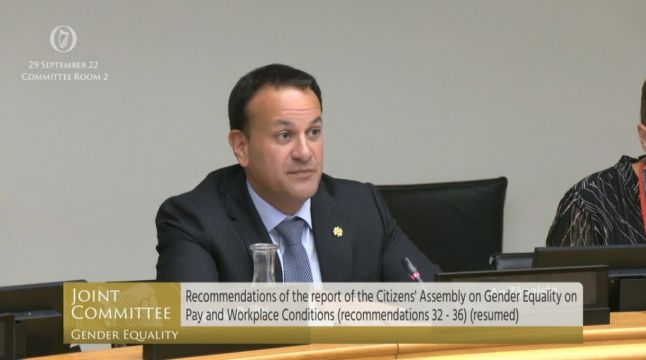The main barrier to women getting into leadership roles and on to company boards is promotional bias, Minister for Enterprise Leo Varadkar has said.
The Tánaiste said there are fewer women working at senior levels within companies, which is not due to lack of opportunities.
He also told the Joint Committee on Gender Equality that barriers faced by women at lower levels are unlikely to be resolved by bringing in mandatory board quotas.
The committee discussed the recommendations of the Citizens’ Assembly on gender equality regarding pay and workplace conditions.
“In terms of the barriers to women getting into leadership positions and getting on to company boards, I think it is probably is down to a degree of promotion bias,” Mr Varadkar said.
“If you look at a lot of organisations, the public service is one example, you’ll see a lot of women up to a certain point and then when you get to the highest tier, there are fewer. There are lots of reasons for that but that’s a problem.
“One thing we want to avoid happening is putting in place a set of quotas, when it’s the same people that turn up all the time on the boards.
“You need a stream of people who are getting promoted and I think there is promotional bias in business at the moment for lots of reasons but that needs to change.”
He added: “The progress at board level in Ireland does show what can be achieved when companies focus on making a change.
“It should also be remembered that the primary reasons for the lack of women in leadership positions in business is not simply a lack of opportunity at senior levels in companies, but barriers at the lower levels that are unlikely to be resolved by mandatory board quotas.
“Carefully monitored voluntary targets helped to promote cultural and strategic change at the heart of companies.
Meanwhile, Mr Varadkar also defended the method used to calculate the proposed living wage.
In June, the Government unveiled plans to introduce a living wage at 60 per cent of the median wage in any given year.
This will bring the national minimum wage of €10.50 per hour up to €12.17 per hour and will be phased in over three years starting in 2023.
Mr Varadkar said the method used was put forward by the Low Pay Commission.
“The worker reps, the employers reps and the independents and academics all recommended that we go forward with 60 per cent of median then rising to 66 per cent of median over time,” the Tánaiste added.
“It’s backed up with a detailed research paper done by Maynooth University, all of which is published.
“There is an alternative approach – the MESL which is the Minimum Essential Standard of living. That approach means that you create a basket of goods and services that you think anyone should be able to afford in order to have a dignified life.
“That’s an option, but there are difficulties with that option.”
He said that in a recession the country could be “hamstrung” by that model as employers would have to cut hours and lay off people in order to keep up with the rising cost of goods.
His response came after Senator Lynn Ruane queried the method used to achieve a living wage for workers.
“For me, if we go with a 60 per cent median rate, we’re still going to miss some of those lowest earners,” Ms Ruan added.
Sinn Féin TD Reada Cronin also queried whether the method was appropriate.
Mr Varadkar said the target is to move to 66 per cent over the next four years from 2023 but said it could be done quicker if economic conditions improve, but warned it could take longer if conditions decline.
“There is some evidence that when you go above 60 per cent, that’s when it starts to impact on employment,” Mr Varadkar said.
“We’ve been very successful in Ireland in increasing wages and workers’ rights in terms of conditions for years and years and years now, without any negative impacts of employment.”
He also told the committee that he thinks it is appropriate that all government bodies adopt the national living wage.







